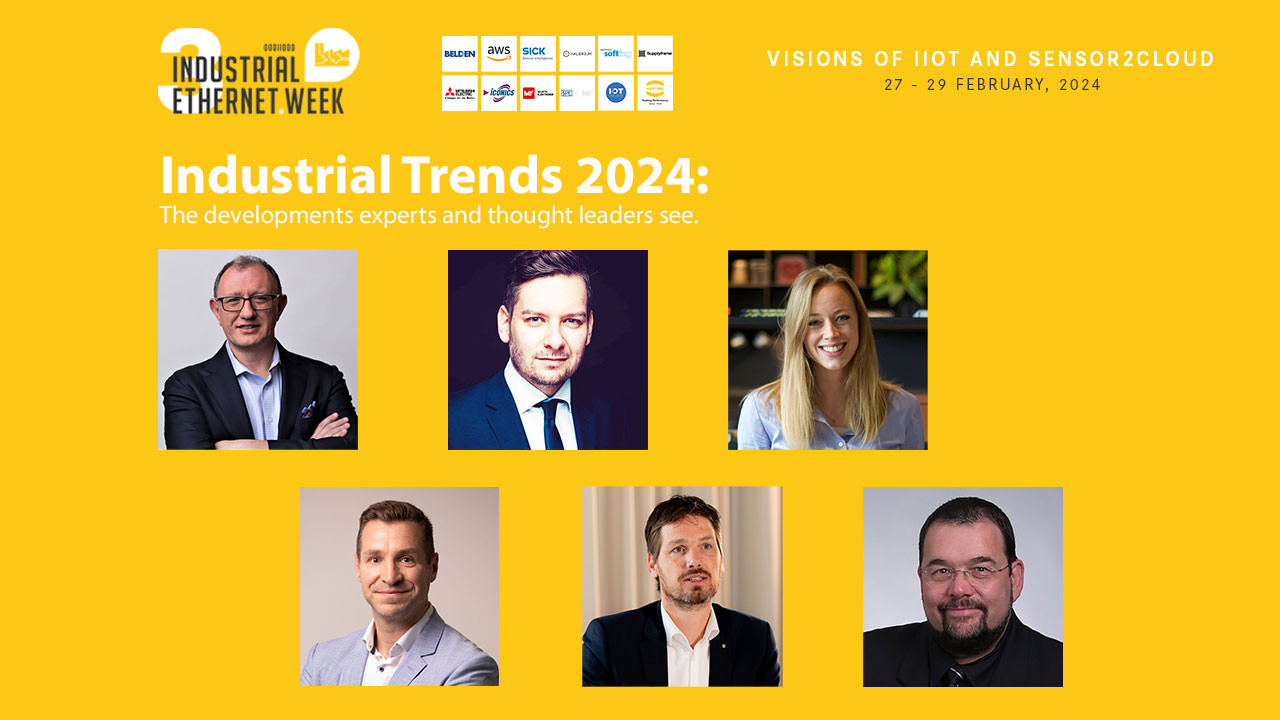Industry NewsJanuary 29, 2024
Industrial Trends 2024: the developments experts and thought leaders see

What trends and developments will characterise industry in 2024? For the third time, the HARTING Technology Group is bringing experts on stage from 27 - 29 February for the HARTING Industrial Ethernet Week 3 to highlight and discuss trends.
Some of the speakers at the Industrial Ethernet Week event have already shared their views on some of the major trends in advance: How do you see developments around the smart factory? What are the key trends in industrial AI? What will have a lasting impact on device development? And what developments are in store for data network technologies that will help establish an IIoT infrastructure? A brief introduction.
Danny Smith, Amazon Web Services
Principal Strategist for Artificial Intelligence responsible for Automotive, Industrial, and Manufacturing Industries at Amazon Web Services

Danny Smith
We will continue to make progress on “having the work find the human” rather than “having the human find the work”. To this end, I see further and continued expansion of both digital twins (replicating physical reality in cyberspace) and intelligence built on top of them – with an emphasis on capabilities to synthesize all the data for humans to gain more insights and ultimately make better decisions. 2024 will be the year technologies that help with human understanding and data contextualization – like generative AI – will become integral to the smart factory and common on the shop floor, and we will see clear separation between manufacturers who embrace this technologies and those who don’t. The key trend in AI is Generative AI, of course!!! We’ve been working on automation to improve efficiencies for many years. 2024 is the year to improve human efficiency, and generative AI will greatly contribute to this. With larger workplace dynamics in play the overall efficiency of the manufacturing line is becoming increasingly constrained by the human in the process. How do we improve efficiency of the human? Generative AI provides mechanisms for faster transfer of institutional knowledge providing the human with the right information at the right time to reduce friction in processes – for more uptime and more profit!
Jan Nieswandt, SICK
Product Market Manager

Jan Nieswandt
In 2024, smart factories will experience ongoing advancements driven by the integration of AI, IoT, and advanced robotics. We expect a more interconnected and intelligent manufacturing landscape, emphasizing agility, real-time analytics, and enhanced automation with improved output and product quality. Cybersecurity measures will be paramount, and a focus on collaborative human-robot interactions will shape the workforce.
Overall, 2024 promises a transformative shift towards more efficient, adaptive, and sustainable smart factories. AI will continue to open potentials in many areas of industrial manufacturing. Areas like quality control, predictive maintenance or supply chain optimization will continue to benefit from the implementation of AI. The usability of the technology will be a key factor for providers and users. Utilizing edge computing for faster data processing will allow real-time decision-making while keeping the users trust into decisions high. The data and the data management itself are crucial asset for AI business providers and should be understood as a mighty differentiator from competitors. Users on the other hand, will only take advantage of the full AI potential if they show openness towards the technology while gaining understanding about the underlaying principles of AI.
Madeleine Mickeleit, IoT UseCase
CEO & Founder of the Berlin-based expert network

Madeleine Mickeleit
“The chicken-and-egg problem in the “IIoT-enabled” smart factory of 2024 raises the question: Which comes first – the business use case or connectivity? Clearly, both must go hand in hand. The interplay of these elements, including cultural aspects, will increasingly determine success in the digitalized production world.
For 2024, I predict an increased use of solutions in which IoT data and ML algorithms go hand in hand. Pilot projects are already increasingly starting with the integration of Large Language Models (LLM). These advanced algorithms enable a new type of interaction and process control in the industrial environment. One example of this is the increasing piloting of systems such as “shopfloor.GPT” – they use the capabilities of LLMs to simplify production processes through natural language input. Users can use voice commands to find instructions, plan maintenance and analyze and interpret machine data. This enables companies to quickly identify the causes of faults and carry out rapid troubleshooting with the help of AI assistants.
In my view, it is crucial to identify the solutions that already work in specific use cases and to select technologies that have market maturity and real monetization potential. These developments will significantly influence and shape industrial business models in the future.”
Sascha Bütterling, Supplyframe
Sales Director DACH – Enterprise SaaS

Sascha Bütterling
The Smart Factory plays a pivotal role in the digital transformation by seamlessly merging the digital realm with the physical world. In 2024, the development of smart factories is likely to continue evolving, driven by advancements in technologies such as the Internet of Things (IoT), artificial intelligence (AI), machine learning, and robotics. Being a part of the Siemens Digital Thread, Supply frame contributes to the expansive interconnected landscape known as the Industrial Metaverse. Within this domain, the Digital Twin extends beyond individual products, encompassing the entire lifecycle from design and sourcing to manufacturing and supply chain processes.
The evolution of technology nodes in electronics presents both significant challenges and a plethora of new opportunities. Simultaneously, one of the most impactful advancements is less rooted in technical aspects and more influenced by shifts in design methodologies. Today it’s even more critical to have a comprehensive 360-degree perspective on products and integrating components into designs necessitates a thorough understanding of the lifecycle and supply chain dynamics. This approach is crucial to prevent costly re-designs and secure the overall lifecycle margin of a product. Success in this dynamic landscape hinges on embracing novel collaborative practices and real-time insights, prompting a fundamental shift in how individuals approach their work.
Thomas Hüsch, Softing IT Networks

Thomas Hüsch
Technical Support & Training
We see that transmissions in the industry are focusing on Industrial Ethernet and increase of the data speed in Industrial Ethernet in the next years. This increases clearly the potential of network malfunctions. The need of qualified testing methods and equipment will increase according to the growth level of ethernet networks.
All future network factory installations should be future proof for higher speeds (4 wiring pairs). Additionally, these Installations should be tested for the ability to transmit speeds up to 10 Gbit/s.
This should be certified with a Cable Certifier, minimum qualified with a Cable Qualifier and not only a wiremap tester. A proper documentation of these installations should be done accordingly.
Dr. Stephan Middelkamp, HARTING Technology Group
General Manager Quality & Technologies

Stephan Middelkamp
The developments and thereby increased awareness of generative AI leads to a push of the smart factory development as well. The possibilities shown by the generative AI tools increase the demand for similar possibilities in industry. In order to achieve this one needs a digital shadow of the factory. This relies on data.
Here the developments of the last years are helping with the possibility to gather more data and bring the data together in comprehensive data models. In this year we will see more and more use cases in which the collected data is evaluated by classic algorithms or AI leading to measurable process improvements.
Industrial Ethernet Week 2024
HARTING Technology Group is bringing experts on stage from 27 – 29 February for the HARTING Industrial Ethernet Week 3 to highlight and discuss trends. Click button below to learn more.

